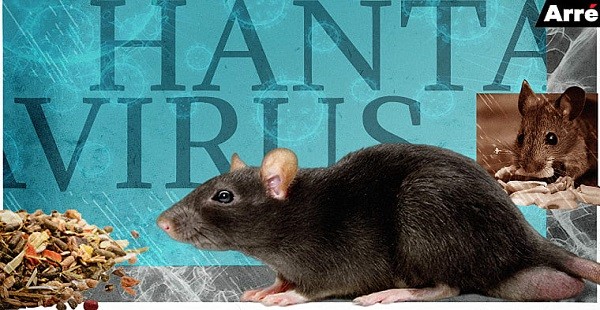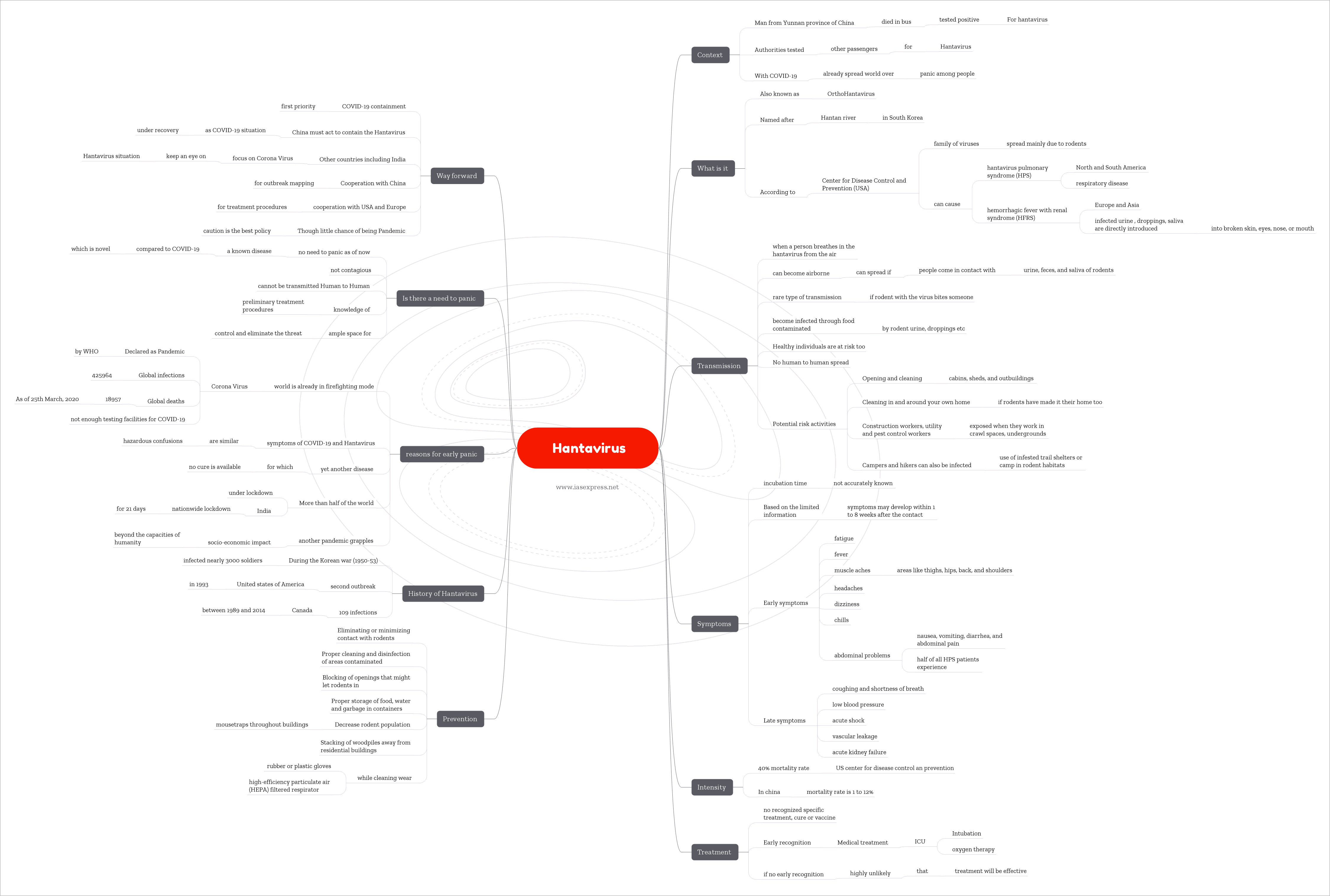Hantavirus – Is it a new global pandemic?

From Current Affairs Notes for UPSC » Editorials & In-depths » This topic
IAS EXPRESS Vs UPSC Prelims 2024: 85+ questions reflected
The news about the death of a man in China due to hantavirus on March 24th sent shockwaves in the countries already reeling under the coronavirus crisis.
Context
- A man from the Yunnan province of China died in bus tested positive for the rodent-borne Hantavirus.
- Authorities tested the other passengers. This prompted fear about another pandemic.
- As the world is already reeling with COVID-19, there was panic around the world about another potential pandemic
What is Hantavirus?
- It is also known as Orthohantavirus.
- It is named after Hantan river of South Korea where it was observed.
According to the Center for Disease Control and Prevention (USA):
- Hantavirus is a family of viruses that is spread mainly due to rodents and can cause varied disease syndromes in people infected.
- It can cause hantavirus pulmonary syndrome (HPS) found in North and South America and hemorrhagic fever with renal syndrome (HFRS) found mainly in Europe and Asia.
- Hantavirus Pulmonary Syndrome (HPS) is a respiratory disease in humans caused by infection with hantaviruses.
- Any person who comes into contact with rodents carrying hantaviruses is prone to be infected by HPS.
- HPRS transmission occurs if infected urine, droppings, saliva are directly introduced into broken skin, eyes, nose, or mouth.
How the Hantavirus is transmitted?
- Hantavirus causes HPS when a person breathes in the hantavirus from the air.
- The Hantavirus can become airborne and can spread if people come in contact with urine, feces, and saliva of rodents.
- A very rare type of transmission is if rodent with the virus bites someone. The virus may spread to that person.
- According to scientists, people can also become infected through food contaminated by urine, droppings, or saliva of an infected rodent.
- Healthy individuals are at risk too if they are exposed to the virus.
- The important fact to know is that this HPS is not known to spread Human to Human and HFRS transmission between people is extremely rare.
What are the potential risk activities for Hantavirus infection?
- Opening and cleaning cabins, sheds, and outbuildings such as garages storage facilities are at potential risk for hantavirus infections, especially in rural areas.
- Cleaning in and around your own home can cause hantavirus if rodents have made it their home too.
- Construction workers, utility and pest control workers are exposed when they work in crawl spaces, undergrounds and in vacant buildings that may have rodents infected.
- Campers and hikers can also be infected because of the use of infested trail shelters or camp in rodent habitats.
What are the symptoms of hantavirus infection?
- The “incubation time” is not accurately known due to the small number of HPS cases.
- Based on the limited information, it can be said that symptoms may develop within 1 to 8 weeks after the contact with fresh urine, droppings, or saliva of infected rodents.
- Early symptoms
- Early universal symptoms are fatigue, fever and muscle aches in areas like thighs, hips, back, and shoulders.
- There are other symptoms such as headaches, dizziness, chills, and abdominal problems like nausea, vomiting, diarrhoea, and abdominal pain. Around half of all HPS patients experience these symptoms.
- Late symptoms
- These include coughing and shortness of breath.
- HFRS can also cause low blood pressure, acute shock, vascular leakage, and acute kidney failure
How fatal is the Hantavirus disease?
- HPS has a mortality rate of around 40%, according to the U.S. Centres for Disease Control and Prevention.
- Around 200 cases of HPS occur every year in North and South America. The average case fatality rate is 40%.
- World over, around 150,000-200,000 cases of haemorrhagic fever due to a hantavirus infection occur each year. Most of these occur in China with an average case fatality rate ranging from 1% to 12%.
How is it diagnosed?
- Diagnosing HPS is difficult in the early days as early symptoms can easily be confused with influenza.
- If the individual is ill with fever and fatigue and has potentially has had a rural rodent exposure, together with shortness of breath, this would be strongly indicative of HPS.
Is there any specific treatment available?
- There is no recognized specific treatment, cure or vaccine for hantavirus infection.
- However, if infected individuals are recognized early and given medical care in an intensive care unit, they may recover. Intubation and oxygen therapy in ICU can help them in a period of severe respiratory distress.
- If a patient is experiencing full distress, it is highly unlikely that the treatment will be effective.
How to prevent Hantavirus infection and spread?
- Eliminating or minimizing contact with rodents at home, workplace, or campsite.
- Proper cleaning and disinfection of areas contaminated by rodent droppings.
- Blocking of openings that might let rodents in.
- Proper storage of food, water, and garbage in containers with tightly closed lids.
- Decrease rodent population through various measures such as mousetraps throughout buildings
- Stacking of woodpiles away from residential buildings.
- If you are cleaning in a confined space, wear rubber or plastic gloves. Also, wear a high-efficiency particulate air (HEPA) filtered respirator.
History of the Hantavirus disease
- During the Korean war (1950-53), it infected nearly 3000 soldiers.
- The second outbreak of the disease occurred in 1993 in the United States of America.
- In between 1989 and 2014, 1713 hantavirus infections were notified in Germany.
What is the reason for the early panic about Hantavirus?
- The world is already in firefighting mode because of Corona Virus. The WHO has declared it as a pandemic.
- As of today, the statistics for COVID-19 according to worldmeters.info are
- Global infections- 425964
- Global deaths- 18957
- There are not enough testing facilities for COVID-19.
- The symptoms of COVID-19 and Hantavirus are similar making it prone to hazardous confusions.
- It is yet another disease for which no cure is available till now. The only cure is prevention and intensive care once infected.
- More than half of the world is under lockdown due to Coronavirus. India declared a 21-day nationwide lockdown from 25th March midnight.
- In this emergency condition, another Pandemic can cause unimaginable damage to the life and economy of the world.
- The death toll per day in Italy is horrifying. If another pandemic grapples the world, the socio-economic impact it could make would be beyond the capacities of humanity.
Is there a need to panic?
- Experts say that there is no need to panic as of now as it is a known disease as compared to COVID-19 which was unknown before the outbreak in Wuhan in December 2019.
- It is not contagious.
- It cannot be transmitted Human to Human as is the case with COVID-19. It only spread through rodent urine, Saliva and droppings contact.
- Although there is no vaccine, Doctors know the preliminary treatment procedures.
- China identified the first case quickly as against COVID-19 which could not be identified before it spread widely.
- Hence there is ample space for control and eliminate the threat.
Way forward
- The first priority must be COVID-19 as it is already a Pandemic.
- Meanwhile, China must act to contain the Hantavirus, as there are reports of recovery and no new case of COVID-19 in the past few days in China.
- Other countries, including India, must focus their energy mainly to fight Corona while keeping an eye on Hantavirus.
- There can be cooperation with China for outbreak mapping and current status.
- As the USA and other European countries are familiar with the Hantavirus, there must be cooperation on tackling strategy on the lines of SAARC COVID-19 initiative.
- Though there is little chance of Hantavirus becoming a global pandemic, as there is no cure to it and it can be a multiplier force along with COVID-19, we must be alert and prepared for the Hantavirus.
Practice Question for Mains
Explain Hantavirus disease. Discuss the potential of hantavirus to become pandemic. What can be done to prevent such a situation? (250 words)
If you like this post, please share your feedback in the comments section below so that we will upload more posts like this.


